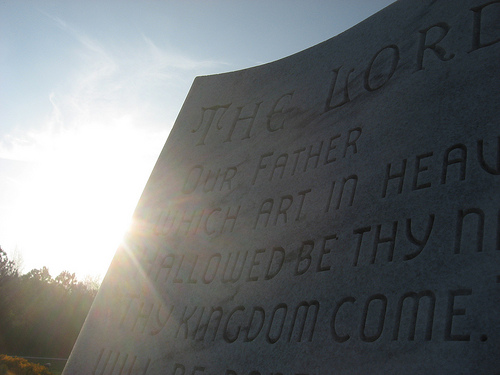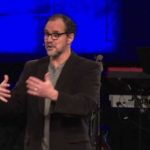We run our website the way we wished the whole internet worked: we provide high quality original content with no ads. We are funded solely by your direct support. Please consider supporting this project.

Reflecting on the Lord’s Prayer
Jesus begins the instruction on prayer (Matthew 6:9-13) by telling his disciples to pray for the Father’s name to be “hallowed,” for his kingdom to come, and for his will to be established on earth as it is in heaven. He is, in effect, telling them to pray for the fulfillment of everything his ministry, and their ministry, is about—glorifying the Father by bringing about the rule and will of God on earth. Such a prayer assumes, however, that the will of God is not being carried out in this present world.
This prayer, then, is a prayer for change, and the change involves moving from a world in which the Father’s name is not honored, his will is not done, and his rule not established, into a world in which these things are as they should be.
This petition is in essence a petition for the arrival of the eschaton, and it has decisive warfare overtones. Jesus is telling his disciples to pray that God’s eschatological reign, effected by the final overthrowing of his cosmic foes, the present world rulers, will be accomplished now.
The same eschatological and warfare significance is found in the petition of the Father to “give us this day our daily bread.” This passage may be implying that the disciples are to rely utterly upon the Father and to trust him for their daily bread as they work to bring about his kingdom rule. However the word “daily” is better translated “tomorrow.” The disciples are being told to pray for the “bread of tomorrow,” referring to the banquet feast planned for the eschaton. It is another way of asking for God’s rule to be established now.
Two points need to be made concerning the next clause, the teaching that we are to ask the Father: “Forgive us our debts, as we also have forgiven our debtors.” First this is not a type of quid pro quo declaration. Jesus is reminding the disciples of their need to forgive in the light of the Father’s forgiveness. He is not teaching the disciples to ask God to condition and proportion his forgiveness on theirs.
Second, the petition is a request that looks ahead to the final judgment. The fatherhood of God in the New Testament is associated with the willingness to forgive, and the full manifestation of this fatherhood, and thus of God’s forgiveness, is understood eschatologically.
The eschatological warfare theme comes out in an especially strong way in the final petition of the prayer: “do not bring us to the time of trial, but rescue us from the evil one.” The word “trial” speaks not of moral “temptation” (cf. NIV) but of trials and hardships. The disciples are not, therefore asking God not to play the role of “the tempter,” something God could never be suspected of doing. They are, rather, asking God to protect them from hardships that accompany their kingdom work.
From whom would they expect such hardships? The closing line of the prayer makes it explicit: “rescue us from the evil one.” Jesus knew that carrying out the Father’s kingdom work would evoke attacks from Satan and his army.
We must understand Jesus to be teaching his disciples to pray not just for protection from satanically inspired trials and hardships in general, but even more fundamentally for deliverance from the fiery end-time trial, or at least for aid in remaining faithful during its terror.
—Adapted from God at War, pages 218-220
Image by cmcgough via Flickr.
Category: General
Tags: Eschatology, Jesus, Kingdom Living, Prayer, Spiritual Warfare
Related Reading

God in Our Image
zen Sutherland via Compfight We came across this piece written by Jonathan Storment earlier this month and we had to share it here. The title of the piece is Everyday Idolatry: My God. He does a great job of outlining the ways that we twist God into whatever we need him to be to prop up…

Podcast: How Does Spiritual Warfare Actually Work?
Greg talks about Spiritual Warfare and the risks of speculating about things we do not know anything about. http://traffic.libsyn.com/askgregboyd/Episode_0331.mp3

The Politics of Jesus, Part 2
Even in the midst of politically-troubled times, we are called to preserve the radical uniqueness of the kingdom. This, after all, is what Jesus did as he engaged the first century world with a different kind of politics (see post). To appreciate the importance of preserving this distinction, we need to understand that the Jewish…

Is Suffering Part of God’s Secret Plan?
In the Christian tradition since Augustine, the most common explanation for the apparent arbitrariness of life and God’s interaction with humanity has been God’s mysterious will—his “secret plan,” as Calvin says. Whether or not a child is born healthy or a wife is killed by an intruder is ultimately decided by God. If we ask…

Jesus, the Light that Blesses
God spoke a promise to Abraham in Genesis 12 that his descendants would be a great nation and that all of the nations would be blessed through him. In this sermon clip, Greg discusses how Jesus became the new Israel that would bring a blessing to all people. You can find the full sermon as well…

Life to the Full
What does it mean to live life to the full? Greg addresses this question in this short video by The Work of the People.
